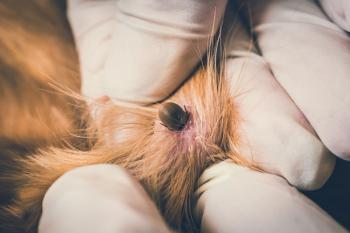
Tick-borne Powassan virus on the rise in humans
Powassan doesn't affect pets (at least that we know of yet), but the rest of us need to remain vigilant about ticks for our own sake, says CVC educator Dr. Richard Gerhold.
There's no evidence that Powassan virus, a tick-borne disease transmitted by the Ixodes species, poses a threat to your veterinary patients. You and your clients are another story, says Richard Gerhold, DVM, MS, PhD. (Did you know the virus is named for the Canadian town in which it was identified after a human fatality?) Click the video to hear more details from Dr. Gerhold or read the edited transcript below.
Q: What can you tell us about the tick-borne Powassan virus that's making headlines in mainstream news?
A: Powassan virus is a disease transmitted by two Ixodes species-the black legged tick and another Ixodes species that we see mainly on wild mammals like raccoons, woodchucks, skunks, possums. It's been around for a while, but we have seen an increased number of cases in humans. It causes encephalitis, so people can have headaches, altered consciousness or flu-like symptoms.
The virus is transmitted anywhere between spring and late fall, even potentially winter. That's the season when these ticks at some life stage are out and about. It's important for people having these symptoms to seek medical help.
There is no evidence of Powassan virus causing disease in pets. However, there are a lot of tick borne diseases that we do see in pets-whether it be Lyme disease, anaplasmosis or Ehrlichia-that are significant health concerns for domestic and livestock animals. So it's important for pets to have good veterinary services and also year-long tick prevention.
I don't want talking about tick diseases to make people not want to go outside, because being outside is really important for mental health and connecting with nature. Just do simple things to minimize tick disease like a good tick check in the evening, tuck your pants in your socks and use repellents.
Newsletter
From exam room tips to practice management insights, get trusted veterinary news delivered straight to your inbox—subscribe to dvm360.




